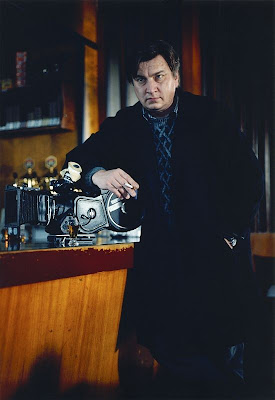He's back. The world's oldest living filmmaker, Manoel de Oliveira, who clocks in at 105, has made yet another full-length feature (of course, he was only 103 when this one was first released), GEBO AND THE SHADOW, which, thanks to Anthology Film Archives here in New York City, is finally getting a week's theatrical release in the USA. Unlike his last couple of full-lengthers -- Eccentricities of a Blond-Haired Girl and The Strange Case of Angelica -- both of which were oddities that didn't easily give up their meaning(s), this new one is as straight-ahead simple as you could wish.
As far back as 2001 and this filmmaker's I'm Going Home, I've off and on been suggesting that maybe it was time that de Oliveira (pictured at right) hung up his camera and typewriter. But then, in 2003, he made A Talking Picture, to my mind one of his best ever, so I determined to keep my mouth and computer shut on the subject. His films are seldom uninteresting, at least in pieces, and his latest is actually one of the more interesting endeavors, if only because it proceeds at such a measured pace, with its theme and story so blatant and repeated that no one could go away from this work wondering what it meant.
This is a dysfunctional family film of major proportions, as it tells the tale of the "missing son," whose absence means that life barely moves and never changes for mother (Claudia Cardinale, above), father (Michael Lonsdale, below), and daughter-in-law (Leonor Silveira). Each seem in thrall to their image of the missing son, with father taking it upon himself to constantly lie to mother to protect her and help keep her spirits "up" (which she never manages to do).
During the first third of the film, everyone complains constantly; in the second third (slight spoiler ahead), missing son shows up but little changes; and then, in the third section, change of a sort does come. The screenplay and its dialog is given to philosophizing a lot: "Were we put into this world to be happy?" (Evidently not.)
Dad keeps busy with his figures and additions (he keep the books for a local company), mom complains and makes coffee for guests (Jeanne Moreau, above, left) and Luís Miguel Cintra (above, second from right).
The philosophizing gets downright crazy, once the son (Ricardo Trêpa, above) takes to doing it: "Deep down, those who kill are those with the biggest hearts." Oh, absolutely! Once the climax occurs and then the denouement, we are left with this moral: The wages of pretense are abysmal in the petty lives of the petite bourgeoisie.
The performers here are only asked to play one note, and being ultra professional -- with great faces that have aged beautifully because they have aged with reality (unlike most of the Hollywood crowd) -- they play that note quite well.
Beautifully shot (by Renato Berta) using a color palette of rich hues of green, brown, and rust, then lighted with a golden glow (the movie is almost exclusively interiors), Gebo and the Shadow is minimalist in every way except the cinematography. The movie -- in French with English subtitles and running 95 minutes -- opens this Wednesday, May 28, and runs through Tuesday, June 3 at Anthology. For directions to AFA, click here; for tickets, click here.



























